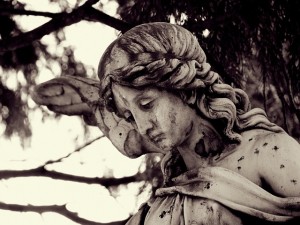It is probable that there is among Protestants a more obstinate—for I really must say so—a more complete misunderstanding on this point of doctrine than on any other. I say “obstinate” for the truth on this point has been stated so repeatedly that it seems impossible that it should not have been, at least to a great extent, accepted in the Protestant world by this time, had it not been for a firm determination not to accept it, and to regard us as either deceivers or deceived regarding it.
George Mary Searle (1839-1918), American astronomer and clergyman and professor at The Catholic University of America, writing about Indulgences in “Plain facts for fair minds: an appeal to candor and common sense”
 Coming next week: Not one but TWO special days on the Church calendar. Tuesday, November 1 is the Feast of All Saints. On this day, we remember those who have gone before us, and who now rest in the arms of our heavenly Father. For Catholics, All Saints Day is a holyday of obligation. That means that attendance at Mass is required unless one has a good reason to be excused from the obligation, such as illness. Wednesday, November 2 is the Commemoration of the Faithful Departed (All Souls Day). On All Souls Day, we remember those who have died but who have not yet achieved perfection, and so are not yet in heaven. This “halfway house” where the believer is gradually conformed to Christ is called Purgatory.
Coming next week: Not one but TWO special days on the Church calendar. Tuesday, November 1 is the Feast of All Saints. On this day, we remember those who have gone before us, and who now rest in the arms of our heavenly Father. For Catholics, All Saints Day is a holyday of obligation. That means that attendance at Mass is required unless one has a good reason to be excused from the obligation, such as illness. Wednesday, November 2 is the Commemoration of the Faithful Departed (All Souls Day). On All Souls Day, we remember those who have died but who have not yet achieved perfection, and so are not yet in heaven. This “halfway house” where the believer is gradually conformed to Christ is called Purgatory.
The Communion of Saints
You say the words in the Creed: “I believe in the communion of saints, the forgiveness of sins, the resurrection of the body, and life everlasting. Amen.” Catholics look to the Scriptures for their understanding of the Communion of Saints. The teaching is based on 1 Corinthians 12, where Paul compares all Christians to a single body. The idea that there is a “communion,” a spiritual connection between believers who can pray for one another is reinforced in 1 Corinthians 6:17 and 1 John 1:3, as well as in other verses. In Hebrews 1:12, the saints in heaven (and the departed souls who have not yet reached the state of perfection, whom the Church teaches are in purgatory) are described as a great “cloud of witnesses” encompassing Christians on earth. An Opportunity to Receive a Plenary Indulgence The Holy Father has granted a plenary indulgence (total remission of the penalty of sin) which may be granted this week, upon fulfillment of certain conditions. Detroit’s Archbishop Allen Vigneron explained the indulgence in a letter released this week. Here is the letter; for more information, check out his column in the Michigan Catholic.
“The souls of the just are in the hand of God, and no torment shall touch them. They seemed, in the view of the foolish, to be dead; and their passing away was thought an affliction and their going forth from us utter destruction. But they are in peace” (Wisdom 3: 1-2). The resurrection of the Lord Jesus gives us confidence that death is only the end of earthly life, but it is not the end of existence (St. Ambrose). Death is indeed the passage to the true fullness of life – the dies natalis, the day of heavenly birth. Christ calls us all to holiness, to eternal life prepared for us in heaven. The Feast of All Saints and All Soul’s Day give liturgical expression to our belief that we, as members of the Church, are also members of the Communion of Saints. We express the belief in this Holy Communion each Sunday as we recite the Creed. In our celebration of the Holy Eucharist we are renewed in our communion with those who have gone before us in faith. From the time of the ancient Church we have honored, respected and prayed for the dead. In the Book of Maccabees the dead are prayed for “because it is a holy and a wholesome thought to pray for the dead that they may be loosed from their sins.” We cannot be received into intimacy with God without having been purified from the consequences of personal sin. Purgatory is the name for this process of purification. In this process, the temporal punishment remaining from sins committed during life is satisfied. As we follow Christ’s footsteps, we, the living, can assist the dead in the process of purification by our prayer, spiritual works and penitential expiation. Our communion in grace and good works is of mutual benefit to the living and the faithful departed. The Church provides a great opportunity to help the departed by performing acts of devotion, repentance and charity. These acts provide remission from temporal punishment and are called indulgences. During the Octave of All Saints, (November 1-8) the Church gives us a special opportunity to gain indulgences for the departed. A plenary or full indulgence, applicable only to the souls in Purgatory, is granted to the faithful who, 1. On any and each day from November 1 to 8, devoutly visit a cemetery and pray, if only mentally, for the departed; or 2. On All Soul’s Day, devoutly visit a church or oratory and recite an Our Father and Creed. A partial indulgence, applicable only to the souls in Purgatory, is granted to the faithful who, 1. Devoutly visit a cemetery and at least mentally pray for the dead; or 2. Devoutly recite lauds and vespers from the Office for the Dead or the prayer Eternal rest grant unto them, O Lord and let the perpetual light shine upon them. May they rest in peace. Amen. It is also necessary to fulfill the following conditions for the plenary indulgence, 1. Make a sacramental confession; and 2. Receive Holy Communion; and 3. Pray for the intention of the Holy Father (no particular prayers are prescribed for the intention of the Holy Father, an Our Father and a Hail Mary are appropriate). These conditions may be fulfilled several days before or after the visit to the Church. A plenary indulgence can only be acquired once in the course of the day; it is, however, fitting that Holy Communion be received and the prayer for the intention of the Holy Father be said on the same day the work is performed. Prayers for the dead, especially offering the Holy Sacrifice of the Mass for their eternal repose, rests securely on this truth expressed so eloquently by St. Paul: “Christ died and came to life, that he might be Lord of both the dead and the living” (Romans 14:9). Image credit: By Sampo Torgo at en.wikipedia [Public domain], from Wikimedia Commons











